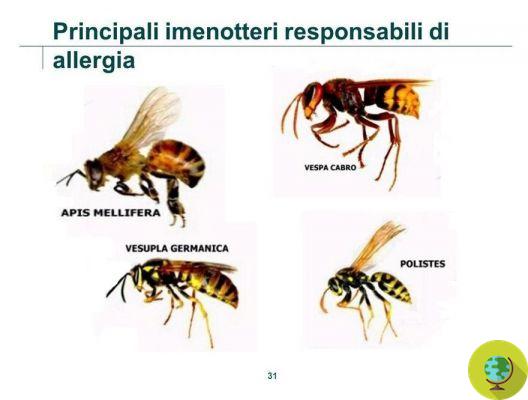
Allergies to the venom of the hymenoptera. In summer, the stings of bees, hornets, wasps and yellowish - and more generally of all poisonous insects - are much more frequent and consequently increase the chances of even serious allergic reactions, such as anaphylactic shock. Especially among those at risk.
Don't store avocado like this: it's dangerous
Allergy to the poison of hymenoptera. In summer, the stings of bees, hornets, wasps and yellowish - and more generally of all poisonous insects - are much more frequent and consequently increase the chances of allergic reactions, even severe ones, as it is anaphylactic shock. Especially among those at risk.
The alarm was raised by the Maugeri Foundation in Milan, which deals with the management of sensitive and allergic patients thanks to a dedicated clinic.
According to experts, in the summer period, the hymenoptera increase their danger, because they tend to nest in dry, warm and sunny places, for example in the gutters, in the ravines of the walls, under the roofs of houses and on the branches of trees, because they are particularly attracted to food, sweet fruit and bright objects.
As such, those who spend a lot of time outdoors may be at greater risk and are more likely to receive one insect sting.
Among the most common risk factors are:
- the type of puncture (those on the face and neck are more dangerous than in other parts of the body);
- the age (the elderly are also in this case more at risk than the young, especially if hypertensive or with heart and respiratory diseases),
- the use of drugs (especially when using antihypertensives),
- the type of insect (the bee is more dangerous than the wasp),
- the consumption of alcohol.
But what should be done in case of an insect bite?
“A subject who, after a sting, manifests a reaction never had before - the doctor said Gianna Moscato, director of the Autonomous Allergy and Immunology Service of the Maugeri Clinic - must go immediately to the emergency room especially in the presence of severe and generalized symptoms such as difficulty in breathing, fainting and pain in the epigastric area; if instead it manifests an extensive local reaction he must go to the treating doctor who will refer him to a specialized center. Subjects with a confirmed diagnosis of allergy to hymenoptera venom they must always carry an adrenaline-based preparation for self-administration. Adrenaline is in fact the only powerful antiallergic capable of acting promptly in the acute phase; the sooner it is administered the greater its effectiveness ".
"In subjects with a confirmed diagnosis, the vaccine - added Carlo Biale, the doctor who directs the clinic - is the only treatment capable of guaranteeing complete protection: it is in fact protective in 95-98% of the patients treated".
Some tips to prevent insect bites
To keep bees, hornets and all potentially dangerous insects away, just follow some precautions:
- it is good dressing in light-colored clothing
- should be avoided strong perfumes and smells,
- it's better do not walk barefoot in the grass
- by car is recommended traveling with the windows closed, while on a scooter it is advisable to cover yourself using not only a full-face helmet, but also gloves and possibly a scarf or bandana to completely cover the neck and shoulders.
Verdiana Amorosi
Read also:
- Insect bites, all the most effective remedies and treatments
- Natural and do-it-yourself remedies for mosquito bites


























